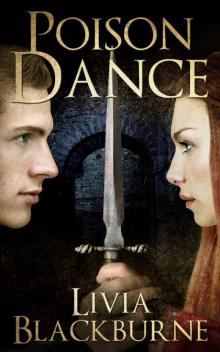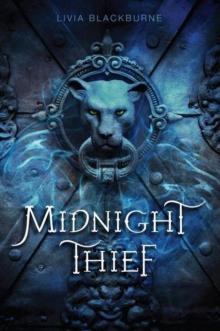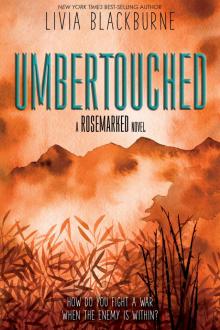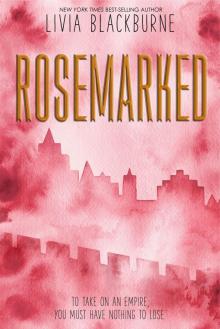- Home
- Livia Blackburne
Umbertouched Page 2
Umbertouched Read online
Page 2
Now the torches turn toward a corral outside the city—a Rovenni encampment, judging by the horses I saw when it was still light. My snake, Diadem, senses my alarm and hisses, tightening her grip around my arm. On my shoulder, Scrawny the crow flutters his wings, while his wingmate Preener caws curiously from a branch above. I run my fingers through Scrawny’s feathers. “Why would they take Dineas to the Rovenni?”
Perhaps it hadn’t been Dineas they’d captured after all. Perhaps he’d convinced them he was one of the horse traders. If he’s safe, he’ll find some way to send me a message. If he’s not...
“We’ll give him until morning.” The crows show no sign of hearing me.
Scrawny resumes poking his beak through my hair. I hope it’s for leaves and dust, rather than anything living. That thought makes me shudder, though, after weeks of travel, I wouldn’t be surprised if he found something. I rub anxiously at the dirt on my arms. My bones are sharp beneath my skin, and my skin sports scratches and bruises on top of my rosemarks. I wish, not for the first time, that Dineas and I could fly across the continent like the crows. Perhaps then, we’d be back home by now, helping our people prepare against the upcoming invasion. It’s been months since I’ve had any news of my family back home: Leora, now a married woman, Alia, with her constant chatter and impish smile, and my parents, who must be desperate to know how I am. I wonder if I’ll see them again. I have to believe that I will.
On my arm, Diadem gradually relaxes, though her tail flicks when Scrawny’s wing beats encroach into her space. She hadn’t welcomed Scrawny’s company at first, but after a few weeks, the crow’s persistence had worn her down. Now the two of them coexist, if not in a completely friendly manner, then at least in a civil one. Perhaps they take their cues from their humans.
A soft flutter sounds above me, and my heart quickens as a third crow—Slicewing—touches down in front of me. Slicewing, who was with Dineas. There’s a parchment tied to her leg.
Thank the Goddess.
Quickly, I untie the message. I’m barely able to make out Dineas’s scrawl in the moonlight. We’ve written enough notes by now that I decode the cipher in my head.
Rovenni will help us cross river if we help them escape. Can you make potions?
I fold the note between my fingers, relief warring with incredulity in my chest. He’s alive, and the empire doesn’t know he’s here. For that, I send up a quick prayer of thanks. But is he really depending on my potions to save us? We’ve been on the run for a month. I’ve nothing but the clothes on my back and the animals with me. And despite what Dineas might think, I cannot mix potions out of moonlight and dirt.
I rub the bridge of my nose, where a light but insistent headache lingers. “What do I do?”
Scrawny fluffs his feathers in what I imagine could be a bird shrug.
I look at the shrubs around me, scouring my memory for herbs I glimpsed on our journey here. In my pouch, I have sweetgrass for stomachaches and puzta flower for wounds—proper healer’s tools from the plains, but nothing that will get someone past a guard. My three remaining blowgun darts are dipped in sleeping potion, but I’d need five different ingredients to make more, none of which are native to this area. There’s nothing I can forage out here that can help me.
Dineas’s note was short, but I can guess much of what he didn’t say. He’s out of immediate danger, but not for long. It’s only a matter of time before someone recognizes him.
I look back out toward the city. If the quarantine is set up like most Amparan quarantines, they’ll have cleared out one corner for the actively ill. There will be healers there, with stocks of useful herbs.
I turn to the birds. “Would you like to come on a mission?”
The climb down the hill is tricky in the dark. Bushes catch at my tunic, and small, spindly trees gouge yet more scratches across my hands and face. Diadem hisses once or twice when a wayward twig hits her, while the crows circle impatiently overhead. Our Rovenni stallion is tied near the bottom of the hill and huffs at my approach. I give him a quick pat and promise to return soon.
A year ago, I would have never thought myself capable of sneaking around in the dark, dodging Amparan soldiers in an unfamiliar land. The past months have changed everything, but still, my blood pounds in my veins as I leave the safety of the hills. Once in the open grassland, I set the crows to scouting. A chill wind stirs up strands of hair that have escaped my braid. The soldiers are concentrated toward the river, but these grasslands are still too exposed for comfort. I feel for the blowgun at my waist, reassuring myself that it’s still there.
Taof is surrounded by a low earthen wall, barely higher than my head. It’s easy enough to find the area they’ve set apart for the fevered. There’s no hint of the shuffles, clinks, and murmurs you’d expect to hear over a city wall at this time of night. I’m alert for guards as I approach, but I don’t see any outside the walls. They’re probably all stationed inside to keep people from fleeing. No one in her right mind would try to enter the quarantine.
I stand on tiptoe to peek over the walls. The street on the other side is empty except for an umbertouched soldier patrolling its length. Farther down the road, several domed tents are set up. A few look like living quarters for healers, but there’s a larger one that’s likely for supplies. I whistle quietly for the crows and point over the wall to the tent.
“Fetch,” I say. They take wing. I let out a long breath through my mouth.
A few moments later, Preener drops a beaded necklace in my hand.
“It’s beautiful, Preener, but that’s not really useful.” He snatches it back and manages to toss it into the air so it drapes over his wings.
Slicewing comes back with bukar root, a fever reducer. Scrawny gifts me a grimy washcloth.
I hold up the bukar root. “Something more like this.” Slicewing plumps her feathers as Scrawny wilts.
After the crows take off again, I hear footsteps on the other side of the wall.
“I see they set up the big tent,” says a young man. “Guess he’s coming after all.”
“You know he likes his comforts,” says another.
The first one snorts. “Someday, when I’m a renowned rose plague physician from the Imperial Academy, I’ll have tapestries in my tent too.”
My breath catches.
His companion snorts. “You’ll be lucky to become the mayor’s chamber pot inspector, the way you shirk your duties.”
There’s only one rose plague physician from the Imperial Academy....
The crows land in a flurry of wings. Slicewing brings the same root again. Preener brings dried vel flower, and Scrawny brings a fuzzy leaf. When I break the leaf in half, a milky liquid with a cloyingly sweet scent oozes out.
I rub the sticky sap between my fingers. This might do, aged in sunlight and snake venom, though my master, Kaylah, wouldn’t like me using it this way. The knowledge given to us by the Goddess is not to be abused. Your potions are to be used only to heal. It’s been six months since I left Monyar as an idealistic young healer, and two months since I ripped my healer’s sash in shame for having broken too many vows to be worthy of it. I’ve broken more vows since then, though the guilt doesn’t get any less.
“More of this,” I say to the crows. “Bring me much more of this.”
The next day, all three crows come into the Rovenni encampment with small packets on their legs. Slicewing bears a note as well.
Smoke is an emetic. Don’t kill.
And then on the next line...
Baruva is here. We can’t leave yet.
I read the last part several times before I can fully believe it. When Zivah and I were in Sehmar City, we learned that Emperor Kiran had intentionally infected his own troops with rose plague so he could cast the blame on our people. Baruva was the healer who’d helped him. We had to flee the city before we could find proof of their guilt, but if Baruva’s here, it might give us a second shot.
Of course, that would mean givi
ng up our chance to flee with the Rovenni.
I write a note back to Zivah. Do you want to stay?
Time goes slowly as I wait for a reply. And when it comes, the handwriting is shakier than usual. We must.
If we stay, who knows how many days we’d lose. From what we’ve heard, the Amparan army left Sehmar two weeks behind us. It marches more slowly than two fugitives on a stallion, but we’ve also had to double back. I try to guess how many days we have to spare, but there’s just too many unknowns. I suspect Zivah’s right about staying, though. If we can find evidence that Kiran raised his hand against the empire’s own troops, it would discredit him completely. And discredited emperors have a hard time waging wars.
I write her back: Meet me at the quarantine wall when the Rovenni run. I hope I don’t live to regret this.
Upon closer inspection, Zivah’s sent us bundles of leaves with some kind of milky white paste on the inside. They smell like something that’s been dead a week.
Nush coughs and makes a face when I show him. “What is that foul poison?”
“Something that should incapacitate the guards quickly and quietly. But you have to swear to keep them alive.”
“Why?”
I shrug. “Healer’s vows. I don’t understand them either.” The answer’s enough to satisfy Nush, though my words set me to wondering how well I really know Zivah these days. Back in Sehmar City, the other version of me had been close with her. Would he have understood?
We make plans over the course of the day, taking care to keep every conversation short and out of sight of the Amparan guards. The Rovenni pick their best fighters. Then there’s nothing to do until sundown.
I’m restless as the sun crawls across the sky. Nush and the others keep busy tending their horses and packing what belongings they can without raising suspicion. Meanwhile, I have nothing to do except torture myself over my capture last night. I still can’t make sense of what happened down by the river, how that soldier’s face shifted into that of my friend from the Amparan army. Right before we escaped Sehmar City, when Zivah restored my memory permanently, she told me I’d taken the last of her potions and that I should be back to normal. If that’s true, then what’s wrong with me?
As night falls, everyone gathers around the campfire. An older rider with a dark, windblown face tells a story of how their ancestors tamed their first horses. A bowl of water is passed unobtrusively around, and everyone dips a cloth in. As the story winds down, I meet Nush’s eyes, and we exchange a nod. The ten Amparan guards outside the enclosure aren’t paying attention, but we’ll have to act fast nonetheless. Nush points to each fighter and then to a guard. I’m to take care of a tall, right-handed swordsman near the enclosure gate.
Quietly, we tie our wet cloths to cover our noses and mouths. Then Nush takes out Zivah’s packets, puts them into a copper bowl, and holds them to the fire, angling his body to hide them from view. As they start to smoke, he fishes them out with tongs and quickly drops each into its own wooden bowl. A putrid odor fills the air.
“Act quickly,” he says.
We scatter. I grab my bowl and run for the fence, lobbing it toward the guard, who stares at the packet and starts coughing. The smoke is something fierce. Even with my mask, my eyes water.
I vault over the fence, fighting the urge to gag. My stomach wants to roll out my throat, but the Amparan soldier has the worst of it, doubled over with his hand over his mouth and nose. I rap him over the head with the butt of my knife. As he falls, his arm comes up, and a sharp pain slices across my bicep. Scars, that was careless of me.
A neigh rings through the night, and a Rovenni mare jumps the fence, her rider crouched expertly in her saddle. Others horses follow suit, some with riders and some without. Shouts sound from the city as the guards finally realize something’s awry.
I need to get to Zivah. I turn toward the city, when a black stallion leaps the fence and cuts in front of my path.
Nush looks down from the saddle. “You’re sure you don’t want to leave with us?”
I shake my head. “I have duties here.”
He gives a matter-of-fact nod. “When you leave Taof, take the eastern trails north to Monyar Strait,” he says “The garrisons there are expert card players and not good at much else. You’ll have the easiest time sneaking past them. May the gods watch over your journey.”
And with that, he gallops away.
It’s easy enough to tell when the Rovenni launch their escape attempt. The shouts of surprised guards carry clearly over the grass, and hoofbeats of fleeing horses shake the ground. As I wait in the shadow of Taof’s walls, our own stallion tosses his mane.
“Wait,” I say. “Dineas will take you to your herd.”
But he takes a mighty leap toward the commotion, ripping his reins from my hand and disappearing into the night. And though we’d been planning to return him, panic stabs through my gut. If it’s taken us so long to come this far, how much longer will it be now that we must travel by foot?
Dineas comes barreling out of the shadows and stumbles to a stop. I can’t see his face, but I recognize his speed, the readiness of his crouch. He casts around, not seeing me. “Zivah?”
“Over here.”
The crows fly celebratory circles around his head as he joins me. “Any trouble?” he asks.
“Not yet.” I hand him his sword, bow, and his quiver, which he straps on. “Are you hurt?”
“Only a little.” Which, coming out of Dineas’s mouth, is not reassuring at all.
“Will the Rovenni make it away?”
“I hope so.” He stares in the direction of the commotion and wipes the sweat from his brow before turning back to me. “This is the only diversion we’ll get. You’re sure you want to use it to get inside?”
I wish he wouldn’t tempt me like this. Haven’t I been away long enough? But finding Baruva’s secrets would do far more to protect my family than anything I could accomplish in Monyar. “I’m sure if you are.”
Dineas hesitates the briefest moment before giving me a confirmatory nod. He steps to the wall and boosts himself over the top.
“No guards,” he says. They must have been called to contain the Rovenni. I climb after him and drop into the middle of an empty street. Not a single sound drifts out from the houses in front of us. Not a single window has light coming from its shutters.
Soft footsteps drift down a side street, and Dineas and I exchange an alarmed glance. He pushes on the door of the nearest house. Locked. The one I try swings open, and we rush inside. As Dineas closes the door, I peek out the window just in time to see a harried-looking healer shuffle by. The street falls silent again.
Dineas curses softly. “I’m dripping blood.”
I resume breathing. “Of course you are. Come here.” I make room for him by the window, where a beam of moonlight offers just the slightest illumination. “Where’s the cut?”
He points to his upper arm.
“Take off your tunic.”
There’s a rustle of cloth as he pulls his shirt over his head. I reach for the dark shape of his arm and pull until he’s positioned to make the most of the light. “Everything moves as normal?”
He responds by wiggling his fingers. “I’m fine.”
“Your fingers aren’t controlled by your biceps.”
He sighs and extends his arm, raising an eyebrow at me as if to ask if I’m satisfied. The gash itself is four fingers long but relatively shallow and straight. I probably don’t need to stitch it, which is good because I don’t have a needle. As I look once more at the wound, my eye is drawn to the rest of him. Like me, he’s lost weight since we fled Sehmar City. His limbs are wiry and lean, the muscles more clearly delineated. I adjust my grip so that only my fingertips are touching his bare skin, rough from our weeks of travel but still warm. The darkness makes it harder to bandage him up, but part of me is glad he can’t see my eyes or my face.
I reach for my waterskin and splash a small amount of water
on his arm, as much as we can spare. “You can’t count on me to keep making weapons for you,” I say. “I’m a healer, not an arsenal.”
His forearm tenses under my grip. “I’ll aim to be more considerate next time I’m trying not to die.”
I sprinkle puzta petals over the cut. “I’ll do what I need to keep us alive. I have so far, haven’t I? It’s just...vows to the Goddess aren’t meant to be taken lightly.”
“If your Goddess wants you to keep your vows, maybe she can do a little more to help us out.”
I’ve had the same thought myself, but I’m not in the mood to agree with him. I drop his arm and feel my way around the darkened room. There are some pallets on the floor with blankets on them. I cut a piece off the one that smells cleanest. “What happened out there? You’ve scouted places far more crowded than that riverbank without being caught.”
He doesn’t answer.
“Dineas?”
“I got careless.”
I know him well enough to tell when he’s being evasive. I also know it’s a waste of breath trying to get him to say more. I layer some sweetgrass over the cut and bind it all with blanket strips. If I’m a little rougher than I need to be, he doesn’t complain.
“Is it too bulky?” I ask. “Can you move?”
“Well enough.”
Silently, we gather our things. Dineas opens the door a crack and peeks out. “Where to first?”
“Let’s look around. See if we can find Baruva or his quarters.”
It’s still eerily quiet outside, the only sounds the occasional shout from the direction of the river. As we head down the street where the healer had gone, I wonder how large an area has been cordoned off for the sick, and how many have been struck thus far. Strewn outside the doors and windows of the houses we pass are hundreds of tiny handmade sculptures made of woven twigs and leaves. The Amparans call these sculptures “promises to Hefana,” and they symbolize offerings the maker will sacrifice to the goddess of healing if she would keep his household safe. Passing from door to door, it’s as if there’s a miniature city at the foot of the real one. Tiny horses of braided grass stand with their forelegs propped on thresholds. Twig wagons wait below windows. There’s even a wooden wine jug decorated with pressed flowers. They all lie abandoned now, and I wonder which of these prayers Hefana will answer. As if in response to my question, the wind shifts and smoke blows in our direction. It comes with the smell of burning flesh—a funeral pyre.

 Poison Dance Proofreading Epub
Poison Dance Proofreading Epub Midnight Thief
Midnight Thief Umbertouched
Umbertouched Rosemarked
Rosemarked